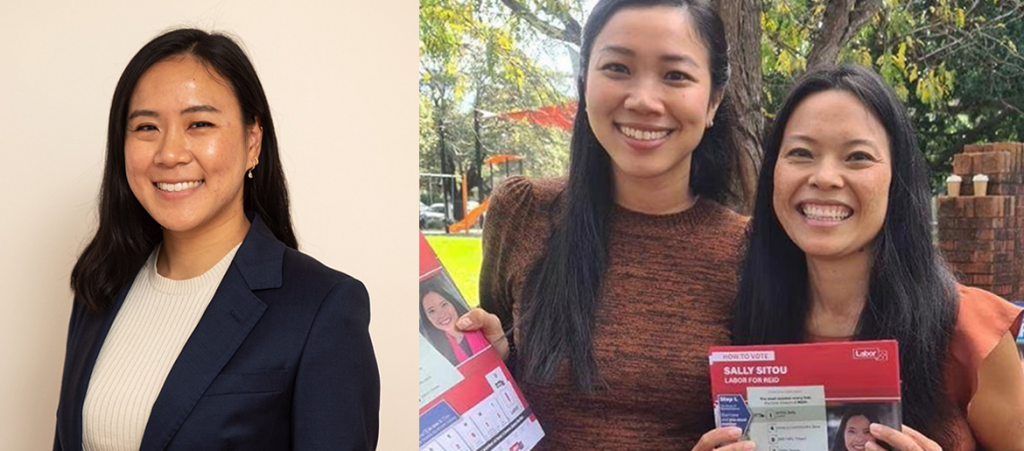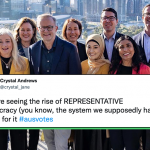
I’ll start with this – this is not a political analysis but a personal one. I don’t work in or around politics, although my interest and engagement have strengthened since becoming involved with Raise Our Voice Australia (ROVA) and the team’s mission to elevate representation of young women and gender diverse people in political and policy-making spaces.
Napping is my go-to coping mechanism and avoidance behaviour. When something seems to be going downhill, I’ll shut my eyes and fall asleep, willing the outcome to be different when I wake up. I successfully used it – to cope with the outcome, rather than change it – through the 2016 US Presidential election, and whenever my team is being thrashed in a one-sided footy game. But on May 21, election night, I did not drift into an anxiety-induced nap . The outcome of the election, including the wave of Asian Australian representation in the elected MPs, was something I could barely have dreamt about. In the wake of the result, here are my personal reflections on an eye-opening election, which I offer as a young Asian Australian woman, a daughter of a migrant and a refugee.
A wake up call
I remember hearing the news that Labor was ‘parachuting’ in former senator Kristina Keneally into the seat of Fowler (NSW) to be the Labor candidate at the 2022 election. Being from Victoria, I had never heard of Fowler and didn’t really comprehend parachuting as a political concept. What I did understand was the the story of the other potential candidate, Tu Le – a young Asian Australian female lawyer, excited by the opportunity to represent her highly multicultural community. Hearing Labor’s decision hurt; the opportunity for a young, female and culturally-diverse voice to be heard in federal Parliament was shut down before it could begin. But the feeling was unsurprising. A recent Raise Our Voice Australia survey run prior to the election found that while only 13% of young women and gender non-conforming people feel represented in politics, this figure halved to just 6% among culturally and linguistically diverse respondents.
This story has an interesting ending though, familiar to anyone following the May 21 results. Despite being a ‘safe’ Labor seat, Fowler did not elect Keneally but opted instead for local independent Dai Le. Le is a woman who arrived in Australia from Vietnam as a refugee and whose background more closely mirrored the those she was seeking to represent. In contrast, Keneally – formerly the Shadow Minister for Home Affairs – had been vocal in her support for harsh refugee policies, including support for cost recovery from people in immigration detention.
Dai Le will take her place in history as our first Member of Parliament who has arrived in Australia as a refugee. Here lies the lesson: when you ignore a community, take them for granted and disrespect their distinct experiences and needs, you open the door for someone else to step in where you could not.
Labor supports cost recovery from people in immigration detention
— Kristina Keneally (@KKeneally) May 12, 2022
The vast majority of people in detention are criminals or have violated their visa
Mr Morrison has been in office for nearly a decade including as immigration minister. Why has he left it to now to announce this?
A significant feeling
I have, and I imagine many others have, become attuned to the ‘norm’ of Australian politics: a rotating slate of predominantly white men (and to a lesser extent, women) representing and deliberating policies for all Australians. But as the election results rolled in, I saw something different. It felt new and significant to see faces and names among the MP-elects that broke the Anglo-Celtic ‘norm’. No less than five female and two male Asian Australian MPs were newly elected across states and political parties. A number of these were surprise wins in electorates that weren’t being closely watched by the media or the political parties.
Asian Australian representation is now firmly on radar now, and instilling cautious optimism that we are moving towards genuine diversity at the highest levels of decision making and representation.
Keeping dreams alive
While this deserves celebrating, according to the 2016 census approximately 16% of Australia’s population is of Asian descent. Even with these newly elected representatives, Asian Australians comprise less than 4% of the lower house. We can still have better representation.
My hope is that these MPs can signal to culturally and linguistically diverse people, particularly young ones, that they deserve to be represented and to be representing. Reflecting on comments shared by respondents in the ROVA survey, I can’t help but wonder how their minds and futures might be swayed by this historic moment. This comment in particular, stuck with me:
“I am a South Asian, disabled, non-binary person. My experience and the experience of those more marginalised than me is not at all represented in politics. And if it was, we would receive even more negativity than the cis white women who are currently in politics.”
It serves as a reminder that political actors must improve their track records of treatment towards women and other marginalised groups to ensure that when diverse people not only feel safe to step into these spaces, but that they are celebrated and recognised when they are there.
I also hope that political representation – aided by succession planning and a genuine interest in communities of colour – is not a blue moon occurrence. This must continue to grow so with each election, the makeup of diverse communities is represented on the ballot. Young people like me deserve to see themselves in their representatives. We live in a representative democracy, after all.




Comments are closed.